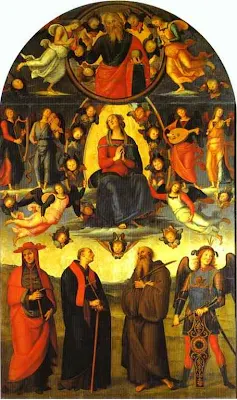One of the unique features of the traditional Benedictine Office is the use of three canticles - psalms from Scriptures outside the book of psalms - as the third Nocturn at Matins.
The number of nocturns and canticles on Sunday is not an accident, but rather a use of the numerological symbolism of which the Fathers were so fond.
Sundays are, above all, a celebration of the Resurrection, which occurred 'on the third day' after Christ's death on the Cross. The inclusion of a the third nocturn 'resurrection vigil' to reinforce this idea may have been something taken over by St Benedict from the early Eastern cathedral tradition.
In the modern form of the Office, there are sets of canticles for use on particular feasts, as well as for the Commons of saints.
CANTICLES FOR THE TEMPORAL CALENDAR
The most often used canticles though, are for the liturgical season, and are as follows:
Advent
Isaiah 40:10-17**updated
Isaiah 42:10-16
Isaiah 49: 7-13
Nativitytide (and Epiphanytide)
Introduction to Isaiah 9:2-7
Introduction to Isaiah 26:1-12
Introduction to Isaiah 66:10-16
Time throughout the year
Introduction to Isaiah 33:2-10
Introduction to Isaiah 33:13-18
Introduction to Ecclesiasticus (Sirach) 36:14-19
Lent and Passiontide
Jeremiah 14:17-21
Lamentations 5:1-7, 15-17, 19-21
Ezekiel 36:24-28
Eastertide
Isaiah 63:1-5
Hosea 6:1-6
Zephaniah (Sophronias) 3:8-13
CANTICLES FOR THE SANCTORAL CALENDAR
In addition to the canticles for the liturgical seasons, particular sets of canticles are also used on Class I&II feasts.
Common of the BVM/Virgin Martyrs/Virgins/Holy Women
Ecclesiasticus (Sirach) 39:17-21
Isaiah 61:10-11, 62:1-3
Isaiah 62:4-7
Common of Apostles/Evangelists
Isaiah 61:6-9
Wisdom 3:7-9
Wisdom 10: 17-21
Common of Popes/one martyr/confessor bishop/confessor
Ecclesiasticus 14:22, 15:3-4, 6
Jeremiah 17:7-8
Ecclesiasticus 31:8-11
Common of several martyrs/Feast of All Saints
Wisdom 3:1-6
Wisdom 3:7-9
Wisdom 10: 17-21
Common of the Dedication of a Church
Tobit 13:10-17
Isaiah 2:2-3
Jeremiah 7:2-7
Other feasts
1 Chron 29: 10-13 (Christ the King no 1)
The number of nocturns and canticles on Sunday is not an accident, but rather a use of the numerological symbolism of which the Fathers were so fond.
Sundays are, above all, a celebration of the Resurrection, which occurred 'on the third day' after Christ's death on the Cross. The inclusion of a the third nocturn 'resurrection vigil' to reinforce this idea may have been something taken over by St Benedict from the early Eastern cathedral tradition.
In the modern form of the Office, there are sets of canticles for use on particular feasts, as well as for the Commons of saints.
CANTICLES FOR THE TEMPORAL CALENDAR
The most often used canticles though, are for the liturgical season, and are as follows:
Advent
Isaiah 40:10-17**updated
Isaiah 42:10-16
Isaiah 49: 7-13
Nativitytide (and Epiphanytide)
Introduction to Isaiah 9:2-7
Introduction to Isaiah 26:1-12
Introduction to Isaiah 66:10-16
Time throughout the year
Introduction to Isaiah 33:2-10
Introduction to Isaiah 33:13-18
Introduction to Ecclesiasticus (Sirach) 36:14-19
Lent and Passiontide
Jeremiah 14:17-21
Lamentations 5:1-7, 15-17, 19-21
Ezekiel 36:24-28
Eastertide
Isaiah 63:1-5
Hosea 6:1-6
Zephaniah (Sophronias) 3:8-13
CANTICLES FOR THE SANCTORAL CALENDAR
In addition to the canticles for the liturgical seasons, particular sets of canticles are also used on Class I&II feasts.
Common of the BVM/Virgin Martyrs/Virgins/Holy Women
Ecclesiasticus (Sirach) 39:17-21
Isaiah 61:10-11, 62:1-3
Isaiah 62:4-7
Common of Apostles/Evangelists
Isaiah 61:6-9
Wisdom 3:7-9
Wisdom 10: 17-21
Common of Popes/one martyr/confessor bishop/confessor
Ecclesiasticus 14:22, 15:3-4, 6
Jeremiah 17:7-8
Ecclesiasticus 31:8-11
Common of several martyrs/Feast of All Saints
Wisdom 3:1-6
Wisdom 3:7-9
Wisdom 10: 17-21
Common of the Dedication of a Church
Tobit 13:10-17
Isaiah 2:2-3
Jeremiah 7:2-7
Other feasts
1 Chron 29: 10-13 (Christ the King no 1)


